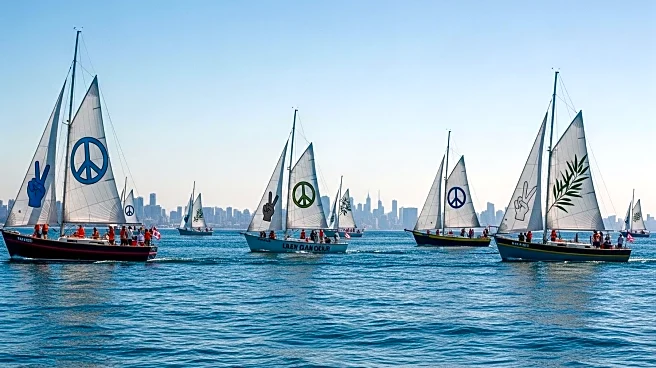What's Happening?
A flotilla carrying activists and humanitarian aid for Gaza has departed from Barcelona for the second time after being delayed by stormy weather. Known as the Global Sumud Flotilla, the mission aims to break the Israeli blockade of Gaza and deliver aid. Initially, the flotilla faced winds exceeding 56 kph, forcing a return to port. Organizers report around 20 vessels with participants from 44 countries, with more expected to join from across the Mediterranean. The flotilla's departure comes amid intensified Israeli military actions in Gaza, where food shortages and famine are reported.
Why It's Important?
The flotilla's attempt to break the Israeli blockade highlights ongoing tensions and humanitarian concerns in Gaza. With the blockade limiting access to essential supplies, the mission underscores the international community's efforts to address the humanitarian crisis. The involvement of high-profile figures like Greta Thunberg and support from celebrities such as Susan Sarandon draws global attention to the plight of Palestinians. This initiative may influence public opinion and diplomatic discussions regarding the Israeli-Palestinian conflict, potentially impacting future policy decisions.
What's Next?
As the flotilla progresses, the Israeli military is expected to intercept the vessels, as has occurred in previous attempts. The outcome of this mission could affect international relations and provoke responses from governments and humanitarian organizations. Continued efforts to break the blockade may lead to increased diplomatic pressure on Israel to ease restrictions on Gaza. The situation remains fluid, with potential for further escalation or negotiation depending on the flotilla's success and subsequent international reactions.
Beyond the Headlines
The flotilla's mission raises ethical questions about the balance between humanitarian aid and political activism. While the initiative aims to provide relief, it also serves as a form of protest against Israeli policies. This dual purpose may complicate perceptions of the mission, influencing how stakeholders engage with the issue. The broader implications of such actions could affect future humanitarian efforts in conflict zones, prompting discussions on the role of activism in addressing global crises.









